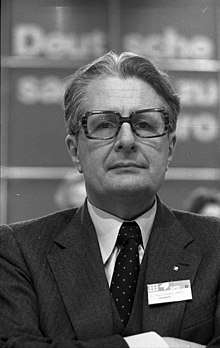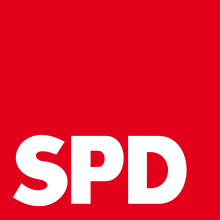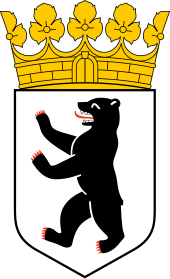Hans-Jochen Vogel
Hans-Jochen Vogel (born 3 February 1926) is a retired German politician and lawyer.
Hans-Jochen Vogel | |
|---|---|
 Hans-Jochen Vogel in 1978 | |
| Leader of the Social Democratic Party | |
| In office 14 June 1987 – 29 May 1991 | |
| Preceded by | Willy Brandt |
| Succeeded by | Björn Engholm |
| Leader of the Social Democratic Party in the Bundestag | |
| In office 8 March 1983 – 12 November 1991 | |
| Preceded by | Herbert Wehner |
| Succeeded by | Hans-Ulrich Klose |
| Governing Mayor of West Berlin | |
| In office 23 January 1981 – 11 June 1981 | |
| Preceded by | Dietrich Stobbe |
| Succeeded by | Richard von Weizsäcker |
| Federal Minister of Justice | |
| In office 16 May 1974 – 22 January 1981 | |
| Chancellor | Helmut Schmidt |
| Preceded by | Gerhard Jahn |
| Succeeded by | Jürgen Schmude |
| Federal Minister of Regional Planning, Construction and Urban Development | |
| In office 15 December 1972 – 16 May 1974 | |
| Chancellor | Willy Brandt |
| Preceded by | Lauritz Lauritzen |
| Succeeded by | Karl Ravens |
| Mayor of Munich | |
| In office 27 March 1960 – 11 June 1972 | |
| Preceded by | Thomas Wimmer |
| Succeeded by | Georg Kronawitter |
| Personal details | |
| Born | 3 February 1926 Göttingen, Province of Hanover, Prussia, Germany |
| Nationality | |
| Political party | Social Democratic Party of Germany (SPD) |
| Relations | Bernhard Vogel (brother) |
| Profession | Jurist, politician |
Early years and professional career
Hans-Jochen Vogel was born in Göttingen. He attended grammar school in Göttingen and in Gießen, where he did his A-levels in 1943. Although he was an active Catholic, he joined the Hitler Youth and even became one of its squad leaders (Scharführer).[1] "… in spite of all my doubts about details it did not occur to me at the time that you can, or even must, resist the state. Especially if I consider the biographies of other young people, for instance, Sophie and Hans Scholl, who came to completely different conclusions. I lived with my parents in Gießen then, I saw the synagogue burn. And nobody helped, on the contrary, the police and the firebrigade made the fire even worse. But not even that really opened my eyes." [2]
In July 1943, at the age of 17, Vogel volunteered for service in the Wehrmacht. Twice wounded at the Italian Front. He was an Unteroffizier at the end of the war, when he was captured by the Americans. On his return from prison camp he worked as a transport worker for a short while, before he was able to study law in Marburg and Munich. He received his doctorate ("summa cum laude") in 1950.
His professional career began in February 1952, when he became a junior official in the Bavarian Ministry of Justice. At the age of 28 he was a county court judge, and in the following year he was appointed chairman of a commission in the Bavarian Prime Minister's Office which was to review Bavarian law for a new survey published by the Bavarian state parliament.[3] Munich City Council made him their legal secretary in 1958.
Vogel and the Social Democratic Party of Germany (SPD)
Hans-Jochen Vogel became a member of the SPD in 1950. Although he was only 34 years old, he was elected Mayor of Munich as the candidate of the SPD on 27 March 1960, with 64.3% of the vote. His popularity increased even more, partly due to his success in tackling the city's traffic problems, and he was re-elected in 1966 with 77.9%. The fact that Munich was chosen as the venue of the 1972 Olympic Games, which had additional beneficial effects on town planning and traffic projects, was to a large extent a result of his efforts.[3]
When Vogel became the leader of the Bavarian Social Democrats and also a member of the executive of the Social Democratic Party of Germany in 1972, he resigned as Mayor of Munich and passed this office on to Georg Kronawitter. He describes his Munich years in his book Die Amtskette ("The Chain of Office"), which was published in the same year.
In the General Elections of 19 November 1972, Vogel was the top candidate of the Bavarian SPD; two years later he was the SPD's top candidate in the elections for the Bavarian State Parliament. Whereas he could not prevent a resounding victory of the CSU (Christian Social Union of Bavaria), he himself gained the best result for any SPD politician in Bavaria after the Second World War.[3] His popularity also showed itself in the General Elections of 1976, when he alone of all the SPD Munich candidates did not lose his Munich North constituency to the CSU.
A new challenge arose in 1981. Dietrich Stobbe stepped down as Mayor of Berlin, and Hans-Jochen Vogel was asked to be his successor and take charge of a deeply divided Berlin SPD. He created a unique "Berlin way" of dealing with the problem of "occupied" houses by granting contracts to the occupiers, while preventing any new occupations at the same time.
Although he managed to successfully deal with his party's difficulties to a large extent, the SPD lost the following Berlin elections, which took place only a few months after Vogel had taken office.
During the following year Vogel was Leader of the Opposition in the parliament of Berlin, before becoming the SPD's top candidate for the German General Elections of 6 March 1983. Helmut Schmidt had been toppled as chancellor by the CDU leader, Helmut Kohl, and did not want to be the SPD's top candidate again. Vogel filled the breach. Disarmament and the problems of the labour market were at the centre of his campaign. But Kohl won the elections.[3]
Minister, Leader of the Parliamentary SPD, and Party Leader
In December 1972 Chancellor Willy Brandt made Vogel Minister for Regional Planning, Building, and Urban Development; Brandt's successor, Helmut Schmidt, made him Minister of Justice in 1974.
After the elections of 1983 Vogel was one of the Berlin MPs in the German parliament. Herbert Wehner, the previous Leader of the Parliamentary SPD, nominated him as his successor, and he held that office until 1991.[3]
Under his leadership the Parliamentary SPD turned against atomic energy after the Chernobyl disaster of 1986.[4]
From 1987 to 1991 Vogel was also the Leader of the Social Democratic Party.
He was an MP in the Bundestag until 1994. "I've never pushed myself into the foreground", he said of himself.[5]
After 1994 Vogel withdrew from active politics. But he has continued to be a member of the project "Against forgetting, in favour of democracy", which tries to spread basic democratic values, as a contrast to the dictatorships of the Nazis and of the SED. Vogel was one of its founders in 1993 and its first chairman.
He received the Galinsky Prize for promoting a better understanding between the Jewish community and its social surroundings (1998) and the highest prize of the Central Council of the Jews in Germany, the Leo Baeck Prize (2001).
From 2001 to 2005 Vogel belonged to the National Ethics Council on the ethical aspects of the questions of biotechnology and its consequences for individuals and society.[6]
Personal characteristics

Originally on the right wing of the SPD, Hans-Jochen Vogel became more and more liberal in his views, for instance, with regard to the legislation about asylum-seekers, referenda, or the protection of personal data from the state. A fact-finding mission to twelve successor states of the former Soviet Union in 1992, when he met numerous presidents, ministers, but also leaders of the opposition, of the Orthodox Church, and of Islam, broadened his outlook, too.
As far as his party was concerned, Vogel was a mediator between the various wings and a centre of integration. But his loyalty and devotion to the SPD did not prevent him from seeking co-operation with the other parties. As the chairman of his party's delegates in a parliamentary commission for reviewing the constitution, he achieved the inclusion of the principles of the protection of the environment and of the promotion of women in society as political aims in the Basic Law. Nevertheless, as he said in his final speech in parliament, he would have liked to see a better representation of East German values in the German constitution after unification.
Hans-Jochen Vogel himself summed up his political attitude best in the following statement: "I am a Social Democrat who would like to reconcile something of a vision with the rather stringent and inexorable knowledge that politics cannot be conducted with clouds of words, but with solid work and craftsmanship." [7]
Vogel is the older brother of CDU politician Bernhard Vogel.
References
- Frankfurter Allgemeine Zeitung, 23/04/2005, p. 42
- http://www.zeit.de/2006/13/Interview_2fVogel_13
- "Archived copy". Archived from the original on 25 March 2012. Retrieved 13 June 2011.CS1 maint: archived copy as title (link)
- "Archived copy". Archived from the original on 22 July 2011. Retrieved 13 June 2011.CS1 maint: archived copy as title (link)
- Rhein-Neckar-Zeitung, Heidelberg, 03/02/2011, p. 20
- http://www.hdg.de/lemo/html/biografien/VogelHansJochen/index.html
- Die Zeit, 27.03.1987
External links
| Wikimedia Commons has media related to Hans-Jochen Vogel. |
- Short biography (in German)
| Party political offices | ||
|---|---|---|
| Preceded by Willy Brandt |
Chairman of the Social Democratic Party of Germany 1987–1991 |
Succeeded by Björn Engholm |
| Political offices | ||
| Preceded by Dietrich Stobbe |
Mayor of West Berlin 1981 |
Succeeded by Richard von Weizsäcker |
| Preceded by Thomas Wimmer |
Mayor of Munich 1960–1972 |
Succeeded by Georg Kronawitter |
| Sporting positions | ||
| Preceded by |
President of Organizing Committee for Summer Olympic Games 1972 |
Succeeded by |



